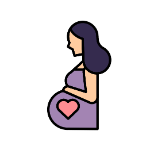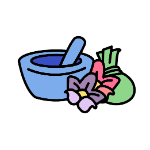
Confinement Wellness
Understanding Traditional Malay Confinement Practices Or "Berpantang"
4 min read | Updated on 30-03-2023 by HappyPreggie
(Image credits to cilisos.my)
In the Malay community, it is a common belief that the birth of a child is actually a gift bestowed by God as it could bring blessings and sustenance to the family. They view newborn babies as something pure and significant which is why in their religion, mothers are put on such a high pedestal. That is also how they came up with the traditional confinement practice that is known as pantang in order to help these amazing women restore their energy and spark again. A Malay mother who had just given birth typically undergoes confinement practice for around 40 to 44 days. It is a period that is accompanied by many restrictions, rules, and taboos but also a very beneficial practise that is made up of many factors.
#1 Hot Compress (Bertuku)
(Image credits to forum1)
This is a form of point massage using heated objects, known as tungku. There are two types of tungku; one is an iron tungku while another is a stone tungku. They vary in size and height depending on the mother’s size. The tungku is heated and wrapped with cloth together with a noni leaf, and is then gently rolled over the belly. This practice helps with shrinking the uterus back to its original shape, improving blood flow and reducing body numbness. This form of massage is also practised by the Chinese community.
#2 Midwifery Practice
(Image credits to TheAsianParent.com)
A midwife in Malay is called ‘bidan’, who restores and maintains the health of a mother who has just given birth. Not only that, the bidan is also accountable in sustaining a healthy reproductive system of a mother. According to Malay tradition, midwifery can only start 1 to 2 weeks after childbirth. The break before beginning the practice is to ensure that the stitches and tears are healed completely. Malay confinement, most commonly known as pantang, is usually observed by the women for 44 days but nowadays, many are choosing to go for a 20 days confinement.
#3 Heat Treatment (Berdiang)
(Image credits to Pantang Plus)
This treatment is done using a brick wrapped with various herbs such as piper sarmentosum (kaduk) leaves, Erythrina fusca Lour leaves (dedap), Piper betle leaf (sirih), lemongrass and ginger. The bricks are then heated before being wrapped with the leaves and a piece of cloth. Next, it is placed beside the body of a woman while she is lying or sleeping. The process is very effective in eliminating toxic substances from the woman's body through her sweat.
#4 Massage (Urut)
(Image credits to Medicalnewstoday.com)
In the Malay culture, the mother’s whole body is massaged for a deep root and therapeutic purpose. The massage would commonly be performed by an expert masseuse.
#5 Wrap (Barut)
(Image credits to Pa&Ma)
For many Malay women, barut is the most vital part of their confinement. Barut or bengkung is a practice that binds the abdomen of a mother in a tight manner. This is done by spreading a herbal paste made from specific herbs and spices on the entire abdomen before binding. The wrapping is done by using a piece of long cloth covering the abdomen area starting from just beneath the breast to the thighs.
#6 Herbal Bath
(Image credits to rumahpantang.com)
Like the Indian traditional confinement practices, there are some mothers who don’t take their baths for the next three days after childbirth. As an alternative, the mother’s body is wiped with warm water to enhance blood flow. During the herbal bath, the temperature of the water needs to be from warm to hot and various types of herbs such as Desmodium gangeticum (daun Meringan) added. This can unwind and release muscle stress that had built up in the mother’s body.
#7 Food and Nutritions (Pantang Makan dan Minum)
(Image credits to 12Fly.com)
A common practice that every culture has is food and drinks that you should avoid and consume. In the Malay culture, they usually believe in not eating or drinking ‘cooling foods’, but consumes ‘heaty foods’ instead. Air Jamu is one common drink consumed by delivered mothers to keep the body heat.
#8 Vagina Steaming (Tangas)
(Image credits to goodnewsfromindonesia.com)
This is a traditional method that uses steam derived from the herbal mixture. This tangas treatment starts with the woman sitting on a wooden chair that has an opening in the middle of the perineum area, thus exposing to the steam or vapour coming from a bucket of steaming water with herbs in it. Experts say that tangas help in restoring the uterus to its original size and position.
Other Taboos
(Image credits to Depositphotos)
- No sex for forty days after postpartum as it’s against their religious teaching
- Avoid knocking your toe to ensure a healthy uterus
- Spatting is prohibited as it is said to descend the uterus
- Cannot leave the bed or loiter around
- To avoid straining the eyes, mothers are not allowed to read or watch TV
As time goes by, it is getting a lot more difficult for many urban Malay women to keep up with the tradition mainly due to the evolving social circumstances and the modern professional demands of today. Hence, there are women who follow solely the traditional approach while some choose to follow only the modern way. However, there are still others, who make up the majority of the mothers, that goes for both traditional and modern postnatal practices to liven up the notion of pantang as an effective recovery tradition.
Want to read more? Check out these amazing facts about the Chinese and Indian's traditional confinement practices.
Join the largest support network for family health and well-being. Ready to get started?
Get started
















